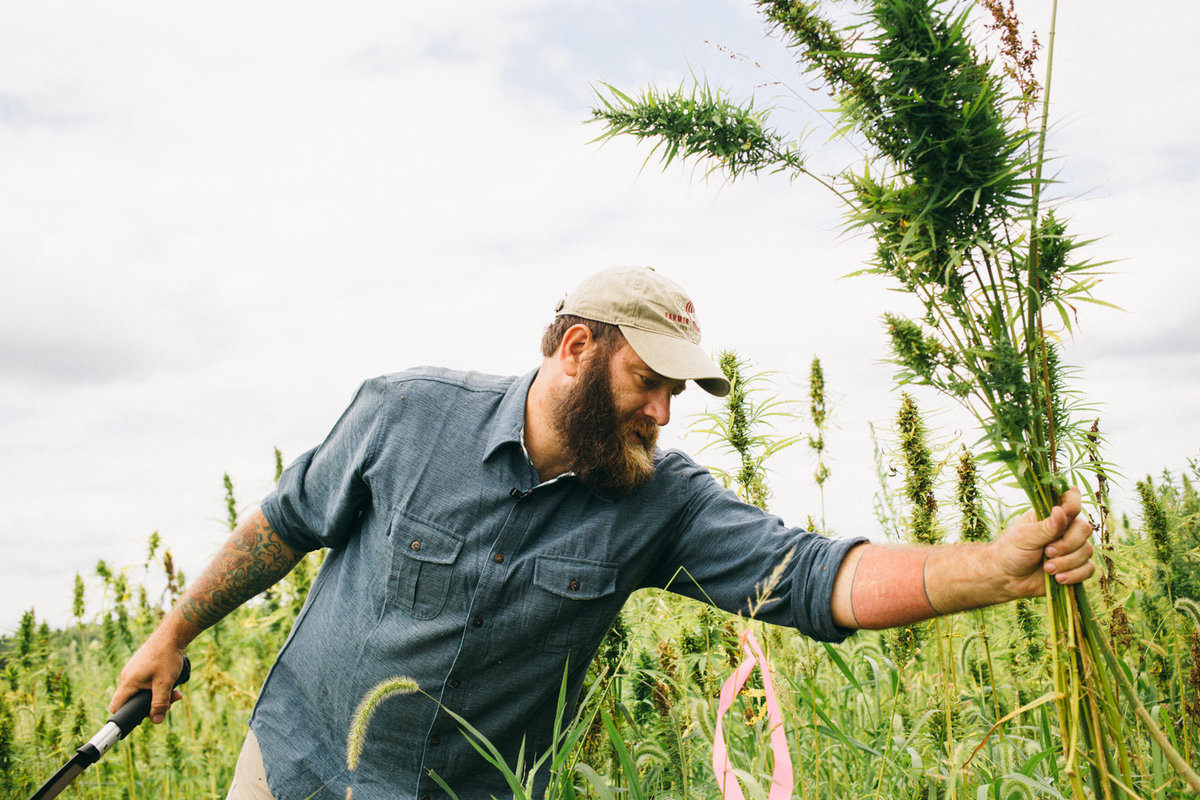Surfer Dan Malloy Talks Filmmaking, Farming & Industrial Hemp
Pro surfer Dan Malloy thinks small farmers should be able to grow industrial hemp. The feds think differently.
Surfer Dan Malloy Talks Filmmaking, Farming & Industrial Hemp
Pro surfer Dan Malloy thinks small farmers should be able to grow industrial hemp. The feds think differently.

Around the world, hemp production is big business. In 2016, the U.S. will import an estimated $500 million in products made of industrial hemp. And since it’s been illegal to grow the crop here without a federal permit since 1970 (when it was added to Schedule I of the Controlled Substances Act and listed with drugs like heroin and LSD, along with its cousin, marijuana), American farmers have been shut out from this potential income stream.
The 2014 Farm Bill included a provision that allowed pilot growing programs in the 27 states that have removed barriers to hemp cultivation. But the Drug Enforcement Administration has been hard-nosed about its implementation. More than a year ago, the Industrial Hemp Farming Act of 2015 was introduced in Congress to make hemp farming legal, but the legislation hasn’t gone anywhere. On July 4, a petition urging Congress to pass the bill will be presented in D.C.
“Harvesting Liberty” follows Mike Lewis, a passionate Kentucky-born-and-bred veteran and farmer who founded Growing Warriors, a nonprofit that helps transition U.S. veterans into farmers, and is an advocate for industrial hemp production. Last year, he was given permission to grow a small hemp crop that was used to produce – with the help of Rebecca Burgess of the regenerative textile advocacy organization Fibershed – an American flag that was flown in Washington D.C. last Veteran’s Day.


We spoke with Malloy about the film, hemp farming, and history.
Modern Farmer: What was the experience of creating “Harvesting Liberty” like for you?
Dan Malloy: It took about eight months, but it wasn’t like we were working on it straight through during that time. We went to Kentucky to film Mike Lewis at his home and to film some of the process of growing and harvesting hemp. We also went to D.C. when Mike was there. It felt like such an honor to be around Mike and the others during that time, getting to witness and capture some of those moments that felt historic. It was hard to make the film because all the pieces were there, so if we didn’t make something decent it was our own fault (laughs). It felt like a lot of pressure to try do it justice.
MF: Were you surprised by anything you learned while making the film?
DM: I really didn’t know how deeply invested our country was in hemp going all the way back to the Colonial period. I’m not an historian, so I’m not going to go start trying to drop any facts. But I will say that it played a critical role in the development of the civilized world. I wanted to tell this story from the perspective of small- and medium-scale farmers, and how legalizing industrial hemp production could be an opportunity for them to have a more viable business. Small- and medium-scale farms need to be preserved and protected as much as any national park. But we shouldn’t just be doing it through grants and subsidies, but also through true opportunities for economic stability. Growing hemp could help, and the fact that we’re actually criminalizing it seems like total craziness.
MF: Did you ever look into the story on how hemp ended up being classified in the same category as heroin and LSD?
DM: I did a fair amount of research on that, but I personally don’t want to get too far into the weeds – no pun intended – on this question. There’s so many crazy conspiracy theories why hemp was made illegal. Some of the stories may be true, but it’s impossible to know. There are so many conflicting reports that I don’t like to go there.
MF: What are you up to now that the film is finished?
DM: I’m chipping away on some smaller projects for Patagonia. Also, my wife and I have a little four-acre educational farm near Ojai called Poco Farms that keeps us super busy. My wife runs it. We have a little citrus orchard, a bunch of chickens and dairy goats, and about two acres for vegetable production. It’s an educational farm for the schools in town. They’re able to get their hands dirty – pick vegetables, gather eggs, and milk goats. It’s awesome to see certain kids who are really zoned in, interested, and excited to be there working. It’s the kind of education I would have really connected with in grammar school and high school.
Watch “Harvesting Liberty” here:
Follow us
This work is licensed under a Creative Commons Attribution-NoDerivatives 4.0 International License.
Want to republish a Modern Farmer story?
We are happy for Modern Farmer stories to be shared, and encourage you to republish our articles for your audience. When doing so, we ask that you follow these guidelines:
Please credit us and our writers
For the author byline, please use “Author Name, Modern Farmer.” At the top of our stories, if on the web, please include this text and link: “This story was originally published by Modern Farmer.”
Please make sure to include a link back to either our home page or the article URL.
At the bottom of the story, please include the following text:
“Modern Farmer is a nonprofit initiative dedicated to raising awareness and catalyzing action at the intersection of food, agriculture, and society. Read more at <link>Modern Farmer</link>.”
Use our widget
We’d like to be able to track our stories, so we ask that if you republish our content, you do so using our widget (located on the left hand side of the article). The HTML code has a built-in tracker that tells us the data and domain where the story was published, as well as view counts.
Check the image requirements
It’s your responsibility to confirm you're licensed to republish images in our articles. Some images, such as those from commercial providers, don't allow their images to be republished without permission or payment. Copyright terms are generally listed in the image caption and attribution. You are welcome to omit our images or substitute with your own. Charts and interactive graphics follow the same rules.
Don’t change too much. Or, ask us first.
Articles must be republished in their entirety. It’s okay to change references to time (“today” to “yesterday”) or location (“Iowa City, IA” to “here”). But please keep everything else the same.
If you feel strongly that a more material edit needs to be made, get in touch with us at [email protected]. We’re happy to discuss it with the original author, but we must have prior approval for changes before publication.
Special cases
Extracts. You may run the first few lines or paragraphs of the article and then say: “Read the full article at Modern Farmer” with a link back to the original article.
Quotes. You may quote authors provided you include a link back to the article URL.
Translations. These require writer approval. To inquire about translation of a Modern Farmer article, contact us at [email protected]
Signed consent / copyright release forms. These are not required, provided you are following these guidelines.
Print. Articles can be republished in print under these same rules, with the exception that you do not need to include the links.
Tag us
When sharing the story on social media, please tag us using the following: - Twitter (@ModFarm) - Facebook (@ModernFarmerMedia) - Instagram (@modfarm)
Use our content respectfully
Modern Farmer is a nonprofit and as such we share our content for free and in good faith in order to reach new audiences. Respectfully,
No selling ads against our stories. It’s okay to put our stories on pages with ads.
Don’t republish our material wholesale, or automatically; you need to select stories to be republished individually.
You have no rights to sell, license, syndicate, or otherwise represent yourself as the authorized owner of our material to any third parties. This means that you cannot actively publish or submit our work for syndication to third party platforms or apps like Apple News or Google News. We understand that publishers cannot fully control when certain third parties automatically summarize or crawl content from publishers’ own sites.
Keep in touch
We want to hear from you if you love Modern Farmer content, have a collaboration idea, or anything else to share. As a nonprofit outlet, we work in service of our community and are always open to comments, feedback, and ideas. Contact us at [email protected].by Andrew Amelinckx, Modern Farmer
June 6, 2016
Modern Farmer Weekly
Solutions Hub
Innovations, ideas and inspiration. Actionable solutions for a resilient food system.
ExploreExplore other topics
Share With Us
We want to hear from Modern Farmer readers who have thoughtful commentary, actionable solutions, or helpful ideas to share.
SubmitNecessary cookies are absolutely essential for the website to function properly. This category only includes cookies that ensures basic functionalities and security features of the website. These cookies do not store any personal information.
Any cookies that may not be particularly necessary for the website to function and are used specifically to collect user personal data via analytics, ads, other embedded contents are termed as non-necessary cookies.